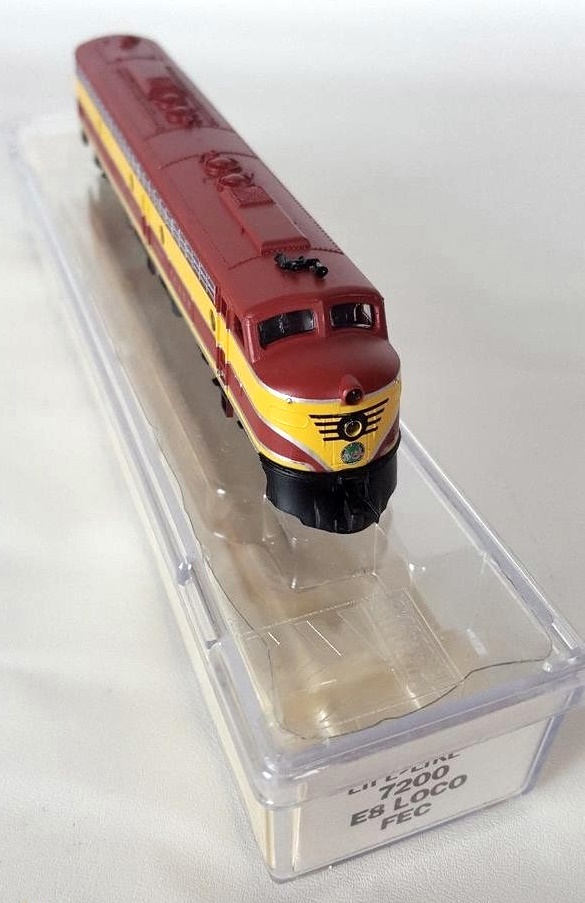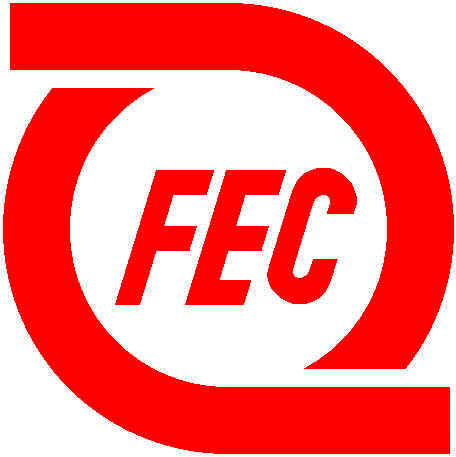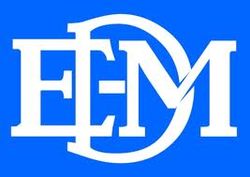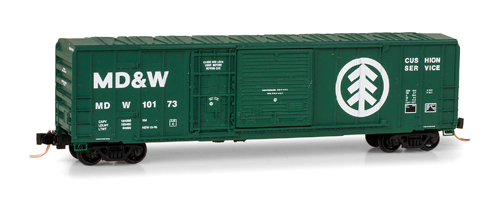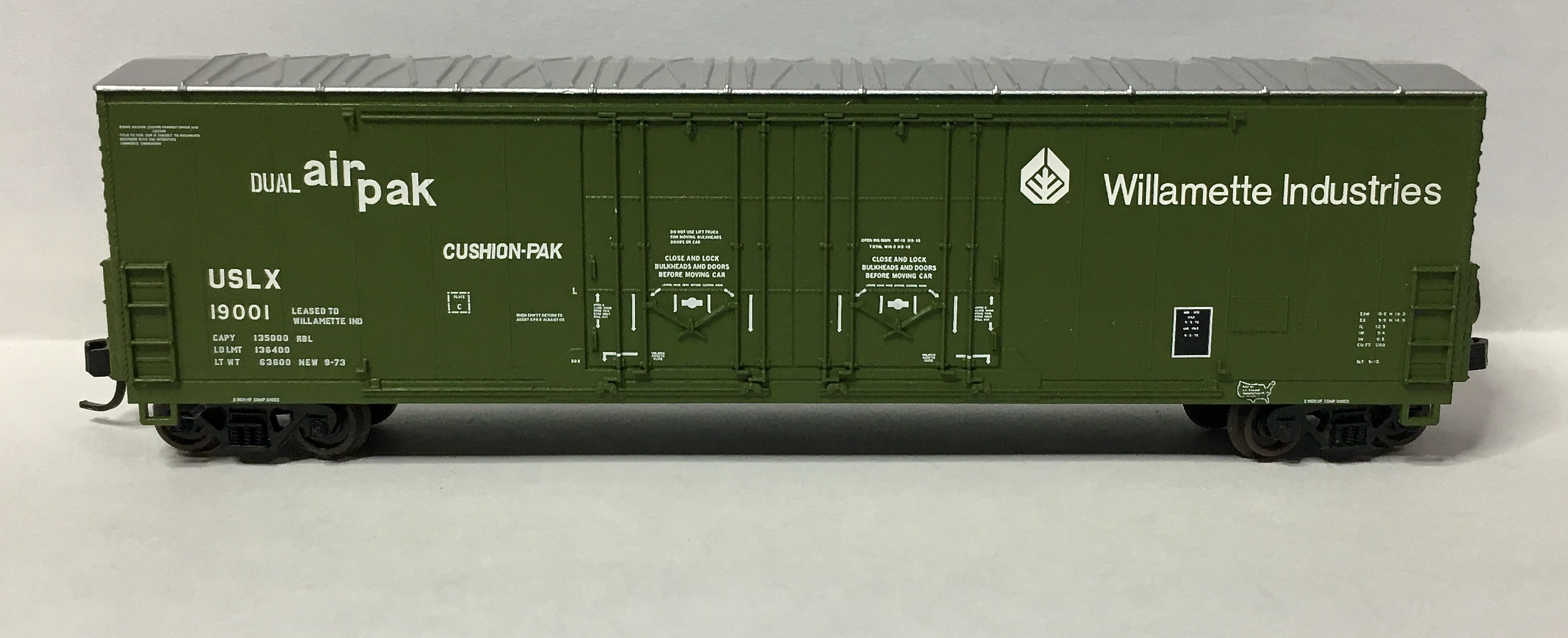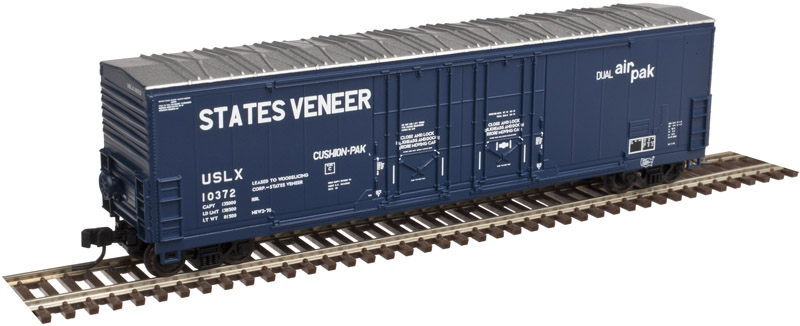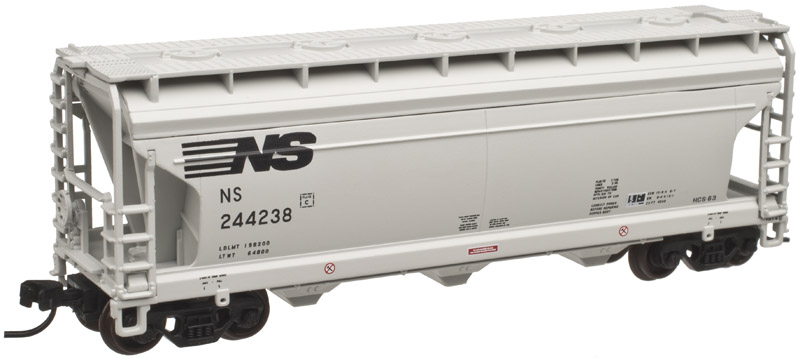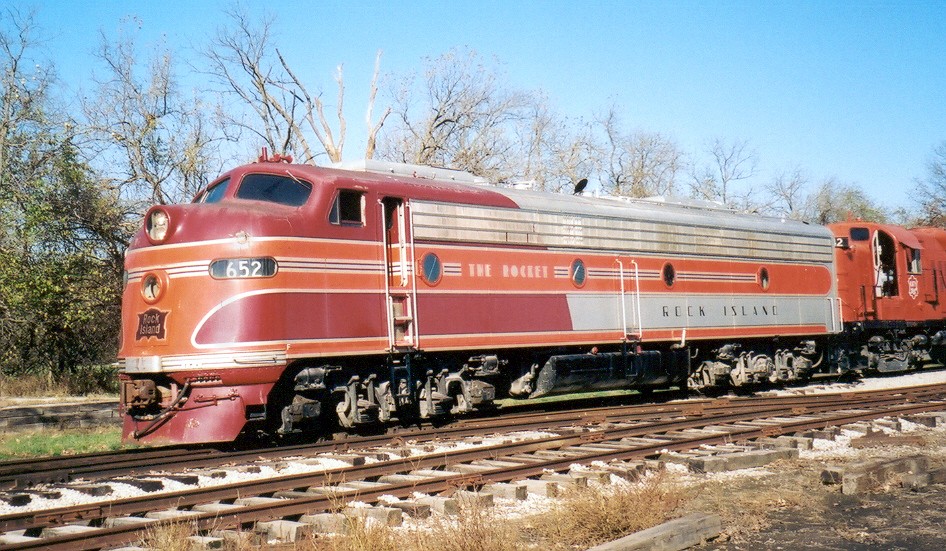Model Information: Life-Like first released this model in 1995. Dummy B units were later released in 1997.
The model was completely revised in 2003 and supplemented by a powered E8B. It was re-run again in 2006 (after Walthers acquired Life-Like); it was sold either as single A-unit or as A+B set, both powered.
Dummy body-mount knuckle coupler in front of A units. Rapido hook in rear of A units and on both sides for B units., truck-mount for the early releases, and body-mount for the 2003/2006 releases.
The model was completely revised in 2003 and supplemented by a powered E8B. It was re-run again in 2006 (after Walthers acquired Life-Like); it was sold either as single A-unit or as A+B set, both powered.
Dummy body-mount knuckle coupler in front of A units. Rapido hook in rear of A units and on both sides for B units., truck-mount for the early releases, and body-mount for the 2003/2006 releases.
DCC Information: None of the versions have support for DCC
Prototype History: The E8 was a 2,250-horsepower (1,678 kW), A1A-A1A passenger-train locomotive built by General Motors' Electro-Motive Division (EMD) of La Grange, Illinois. 450 cab versions, or E8As, were built from August 1949 to January 1954, 447 for the U.S. and 3 for Canada. 46 E8Bs were built from December 1949 to January 1954, all for the U.S. The 2,250 hp came from two 12 cylinder model 567B engines, each driving a generator to power the two traction motors on one truck. The E8 was the ninth model in the line of passenger diesels of similar design known as EMD E-units. Starting in September 1953 at total of 21 E8As were built which used either the 567BC or 567C engines.
Most of the premier passenger trains including the AT&SF "Super Chief," various CB&Q "Zephyrs," Great Northern's "Empire Builder," New York Central's "Twentieth Century" and Pennsylvania Railroad's "Broadway Limited" were pulled by EMD "E" unit diesel locomotives from the 1940's to the 1970's.
In profile the front of the nose of E7, E8, and E9 units is less slanted than earlier EMD units, and E7/8/9s (and their four axle cousins, the F-unit series) have been nicknamed bulldog nose units. Earlier E-unit locomotives were nicknamed slant nose units. After passenger trains were canceled on the Erie Lackawanna in 1970, the E8s were re-geared for freight and were very reliable for the EL. These units were on freight trains until the early years of Consolidated Railroad Corporation ("Conrail").
Units noted with the designation E8m were rebuilt using components from earlier EMC/EMD locomotives. Externally the units look just like E8s. The difference in horsepower produced in these E8m units is because the older generators are reused.
From Wikipedia
Read more on American-Rails.com
Most of the premier passenger trains including the AT&SF "Super Chief," various CB&Q "Zephyrs," Great Northern's "Empire Builder," New York Central's "Twentieth Century" and Pennsylvania Railroad's "Broadway Limited" were pulled by EMD "E" unit diesel locomotives from the 1940's to the 1970's.
In profile the front of the nose of E7, E8, and E9 units is less slanted than earlier EMD units, and E7/8/9s (and their four axle cousins, the F-unit series) have been nicknamed bulldog nose units. Earlier E-unit locomotives were nicknamed slant nose units. After passenger trains were canceled on the Erie Lackawanna in 1970, the E8s were re-geared for freight and were very reliable for the EL. These units were on freight trains until the early years of Consolidated Railroad Corporation ("Conrail").
Units noted with the designation E8m were rebuilt using components from earlier EMC/EMD locomotives. Externally the units look just like E8s. The difference in horsepower produced in these E8m units is because the older generators are reused.
From Wikipedia
Read more on American-Rails.com
Road Name History: The Florida East Coast Railway (reporting mark FEC) is a Class II railroad operating in the U.S. state of Florida and since 2007 has been a subsidiary of Railroad Acquisition Holdings, LLC, itself a subsidiary of Fortress Investment Group, LLC.
The FEC was historically a Class I railroad owned by Florida East Coast Industries (FECI) from 2000-2006, FOXX Holdings from 1983-2000, and the St. Joseph Paper Company prior to 1983.
Built primarily in the last quarter of the 19th century and the first decade of the 20th century, the FEC was a project of Standard Oil principal Henry Morrison Flagler. Flagler originally visited Florida to aid with the health issues faced by his first wife, Mary. A key strategist who worked closely with John D. Rockefeller building the Standard Oil Trust, Henry Flagler noted both a lack of services and great potential during his stay at St. Augustine. He subsequently began what amounted to his second career developing resorts, industries, and communities all along Florida's shores abutting the Atlantic Ocean.
The FEC is possibly best known for building the railroad to Key West, completed in 1912. When the FEC's line from the mainland to Key West was heavily damaged by the Labor Day Hurricane of 1935, the State of Florida purchased the remaining right-of-way and bridges south of Dade County, and they were rebuilt into road bridges for vehicle traffic and became known as the Overseas Highway. However, a greater and lasting Flagler legacy was the developments along Florida's eastern coast.
During the Great Depression, control was purchased by heirs of the du Pont family. After 30 years of fragile financial condition, the FEC, under leadership of a new president, Ed Ball, took on the labor unions. Ball claimed the company could not afford the same costs as larger Class 1 railroads and needed to invest saved funds in its infrastructure, fast becoming a safety issue. Using replacement workers, the company and some of its employees engaged in one of the longest and more violent labor conflicts of the 20th century from 1963 until 1977. Ultimately, federal authorities had to intervene to stop the violence, which included bombings, shootings and vandalism. However, the courts ruled in the FEC's favor with regard to the right to employ strikebreakers. During this time, Ball invested heavily in numerous steps to improve its physical plant, installed various forms of automation,was the first US Railroad to operate two man train crews, eliminate cabooses and end all of its passenger services (which were unprofitable) by 1968.
In modern times, the company's primary rail revenues come from its intermodal and rock trains. Since 2007, it has been owned by Fortress Investment Group,[citation needed] which acquired it for over US$3 billion (including non-rail assets). Fortress previously owned conglomerate short line railroad operator RailAmerica, which for a time operated FEC but the two companies never merged; Fortress no longer owns RailAmerica and RailAmerica no longer operates FEC. A former CSX official, James Hertwig, was named as President and Chief Executive Officer of the company effective July 1, 2010.
From Wikipedia
The FEC was historically a Class I railroad owned by Florida East Coast Industries (FECI) from 2000-2006, FOXX Holdings from 1983-2000, and the St. Joseph Paper Company prior to 1983.
Built primarily in the last quarter of the 19th century and the first decade of the 20th century, the FEC was a project of Standard Oil principal Henry Morrison Flagler. Flagler originally visited Florida to aid with the health issues faced by his first wife, Mary. A key strategist who worked closely with John D. Rockefeller building the Standard Oil Trust, Henry Flagler noted both a lack of services and great potential during his stay at St. Augustine. He subsequently began what amounted to his second career developing resorts, industries, and communities all along Florida's shores abutting the Atlantic Ocean.
The FEC is possibly best known for building the railroad to Key West, completed in 1912. When the FEC's line from the mainland to Key West was heavily damaged by the Labor Day Hurricane of 1935, the State of Florida purchased the remaining right-of-way and bridges south of Dade County, and they were rebuilt into road bridges for vehicle traffic and became known as the Overseas Highway. However, a greater and lasting Flagler legacy was the developments along Florida's eastern coast.
During the Great Depression, control was purchased by heirs of the du Pont family. After 30 years of fragile financial condition, the FEC, under leadership of a new president, Ed Ball, took on the labor unions. Ball claimed the company could not afford the same costs as larger Class 1 railroads and needed to invest saved funds in its infrastructure, fast becoming a safety issue. Using replacement workers, the company and some of its employees engaged in one of the longest and more violent labor conflicts of the 20th century from 1963 until 1977. Ultimately, federal authorities had to intervene to stop the violence, which included bombings, shootings and vandalism. However, the courts ruled in the FEC's favor with regard to the right to employ strikebreakers. During this time, Ball invested heavily in numerous steps to improve its physical plant, installed various forms of automation,was the first US Railroad to operate two man train crews, eliminate cabooses and end all of its passenger services (which were unprofitable) by 1968.
In modern times, the company's primary rail revenues come from its intermodal and rock trains. Since 2007, it has been owned by Fortress Investment Group,[citation needed] which acquired it for over US$3 billion (including non-rail assets). Fortress previously owned conglomerate short line railroad operator RailAmerica, which for a time operated FEC but the two companies never merged; Fortress no longer owns RailAmerica and RailAmerica no longer operates FEC. A former CSX official, James Hertwig, was named as President and Chief Executive Officer of the company effective July 1, 2010.
From Wikipedia
Brand/Importer Information:  Life-Like Products LLC (now Life-Like Toy and Hobby division of Wm. K. Walthers) was a manufacturer of model railroad products and was based in Baltimore, Maryland.
Life-Like Products LLC (now Life-Like Toy and Hobby division of Wm. K. Walthers) was a manufacturer of model railroad products and was based in Baltimore, Maryland.
It was founded in the 1950s by a company that pioneered extruded foam ice chests under the Lifoam trademark. Because ice chests are a summer seasonal item, the company needed a way to keep the factory operating year round. As model railroading was becoming popular in the post-war years, they saw this as an opportunity and so manufactured extruded foam tunnels for model trains. Over the years, Life-Like expanded into other scenery items, finally manufacturing rolling stock beginning in the late 1960s. At some point in the early 1970s, Life-Like purchased Varney Inc. and began to produce the former Varney line as its own.
The Canadian distributor for Life-Like products, Canadian Hobbycraft, saw a missing segment in market for Canadian model prototypes, and started producing a few Canadian models that were later, with a few modifications, offered in the US market with US roadnames.
In 2005, the company, now known as Lifoam Industries, LLC, decided to concentrate on their core products of extruded foam and sold their model railroad operations to Wm. K. Walthers.
In June 2018, Atlas and Walthers announced to have reached an agreement under which all Walthers N scale rolling stock tooling, including the former Life-Like tooling, will be purchased by Atlas.
Read more on Wikipedia and The Train Collectors Association.

It was founded in the 1950s by a company that pioneered extruded foam ice chests under the Lifoam trademark. Because ice chests are a summer seasonal item, the company needed a way to keep the factory operating year round. As model railroading was becoming popular in the post-war years, they saw this as an opportunity and so manufactured extruded foam tunnels for model trains. Over the years, Life-Like expanded into other scenery items, finally manufacturing rolling stock beginning in the late 1960s. At some point in the early 1970s, Life-Like purchased Varney Inc. and began to produce the former Varney line as its own.
The Canadian distributor for Life-Like products, Canadian Hobbycraft, saw a missing segment in market for Canadian model prototypes, and started producing a few Canadian models that were later, with a few modifications, offered in the US market with US roadnames.
In 2005, the company, now known as Lifoam Industries, LLC, decided to concentrate on their core products of extruded foam and sold their model railroad operations to Wm. K. Walthers.
In June 2018, Atlas and Walthers announced to have reached an agreement under which all Walthers N scale rolling stock tooling, including the former Life-Like tooling, will be purchased by Atlas.
Read more on Wikipedia and The Train Collectors Association.
Item created by: Alain LM on 2021-09-13 11:49:54. Last edited by Alain LM on 2021-09-13 11:51:30
If you see errors or missing data in this entry, please feel free to log in and edit it. Anyone with a Gmail account can log in instantly.
If you see errors or missing data in this entry, please feel free to log in and edit it. Anyone with a Gmail account can log in instantly.



